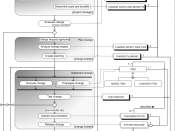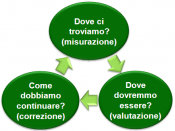Definition of Organizational Change Management
Organizational change management refers to the practice of properly managing large, organizational changes in business. Change management is a quickly evolving practice designed to help support both managers and employers through the change process. As large changes can be very disruptive to an organization, change management seeks to minimize these impacts, while improving the efficiency of the change, and allowing the company to focus on continued growth. Managing change means making required changes in a planned and systematic fashion. As such, change management requires a variety of skills to be effective. These include managing employees and expectations, handling office or corporate politics, analyzing situations and reacting quickly to solve problems, basic business skills and understanding, and importantly, strong people skills.
Provocations of Organizational Change
Change should not be made for the sake of making change - it is a strategy for accomplishing some overall goal.
Usually organizational change is provoked by some major outside driving force. Examples of these driving forces include: the need to make substantial cuts in funding, the need to address new, major markets/clients, and the need for dramatic increases in productivity/services. Typically, organizations must undertake organization-wide change to evolve to a different level in their life cycle--for example, going from a highly reactive, entrepreneurial organization to a more stable and planned development. Similarly, transition to a new chief executive can provoke organization-wide change when the executive's new and unique personality pervades the entire organization.
Difficulties of Organization-Wide Change
Typically there are strong resistances to change. People are afraid of the unknown. Often employees think things are fine the way they are and do not understand the need for change. Usually, individuals are inherently cynical about change. Many doubt there are effective means to accomplish major organizational change. Often there are conflicting...


